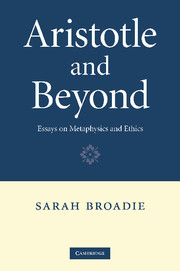Book contents
- Frontmatter
- Contents
- Preface
- Acknowledgments
- Chapter 1 Affecting and being affected
- Chapter 2 Backwards causation and continuing
- Chapter 3 From necessity to fate: An inevitable step?
- Chapter 4 Alternative world-histories
- Chapter 5 A contemporary look at Aristotle's changing Now
- Chapter 6 Nature and craft in Aristotelian teleology
- Chapter 7 Soul and body in Plato and Descartes
- Chapter 8 Aristotle and contemporary ethics
- Chapter 9 On the idea of the summum bonum
- Chapter 10 What should we mean by ‘the highest good’?
- Chapter 11 The good of practical beings: Aristotelian perspectives
- Chapter 12 Taking stock of leisure
- References
- Index of names
Chapter 6 - Nature and craft in Aristotelian teleology
Published online by Cambridge University Press: 25 June 2009
- Frontmatter
- Contents
- Preface
- Acknowledgments
- Chapter 1 Affecting and being affected
- Chapter 2 Backwards causation and continuing
- Chapter 3 From necessity to fate: An inevitable step?
- Chapter 4 Alternative world-histories
- Chapter 5 A contemporary look at Aristotle's changing Now
- Chapter 6 Nature and craft in Aristotelian teleology
- Chapter 7 Soul and body in Plato and Descartes
- Chapter 8 Aristotle and contemporary ethics
- Chapter 9 On the idea of the summum bonum
- Chapter 10 What should we mean by ‘the highest good’?
- Chapter 11 The good of practical beings: Aristotelian perspectives
- Chapter 12 Taking stock of leisure
- References
- Index of names
Summary
PART A: INTRODUCTION
(1) It used quite commonly to be argued against Aristotelian teleology that this type of explanation founders for lack of a suitable psychological basis in most of the phenomena for which it was invoked. The objection was that it does not make sense to attempt to explain X as happening or existing in order that Y should happen or exist unless one assumes that the production of X and Y is guided by thoughts, desires or conscious purposes relating Y as end to X as means. Yet Aristotle himself makes it clear that the domain in which, as he believes, teleological explanation is not merely illuminating but mandatory if we are to have any adequate scientific explanations at all, extends well beyond the domain of entities to which beliefs, desires and conscious purposes can be reasonably ascribed. Nor, on the other hand, does Aristotle protect himself against the objection by introducing a supernatural being who produces or shapes phenomena in accordance with divine intent. Thus if the application of teleology does depend on the presence of psychological factors such as those mentioned, it is a dependence which Aristotle fails outright to notice. Alternatively, there is no such failure because the claimed dependence does not hold.
(2) This poses the question: Is a non-psychological teleology as intelligible as Aristotle evidently takes it to be? We may be tempted to turn a deaf ear to this question if it seems to us that in other respects Aristotelian teleological explanations are effective or at any rate more effective than alternatives given the state of knowledge.
- Type
- Chapter
- Information
- Aristotle and BeyondEssays on Metaphysics and Ethics, pp. 85 - 100Publisher: Cambridge University PressPrint publication year: 2007
- 1
- Cited by



